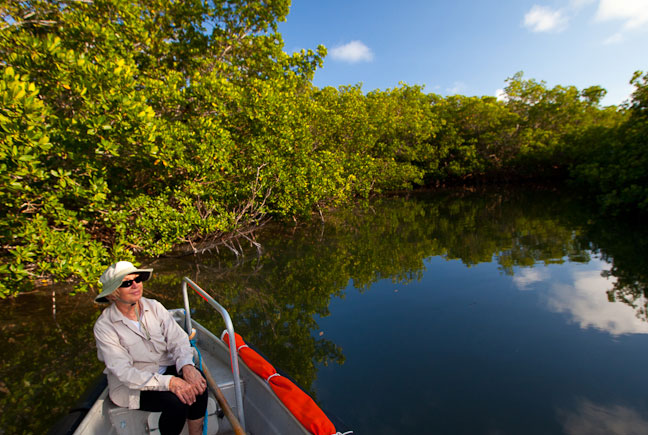
At the suggestion of a SetSail visitor we took of yesterday afternoon to have a look at Whiskey Creek.
Steve and Linda write a regular column for SetSailors from wherever they happen to be. Join in as they cruise the world and discuss topics of interest to sailors everywhere. Here you’ll find their articles dating from 1996 to the present.

At the suggestion of a SetSail visitor we took of yesterday afternoon to have a look at Whiskey Creek.
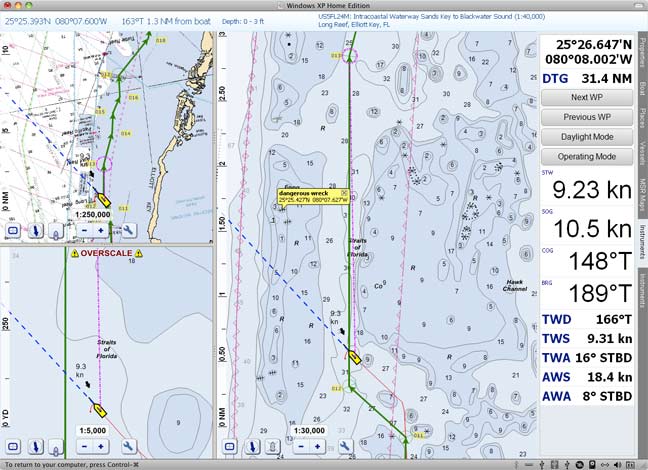
We have been using the latest iteration of Coastal Explorer this spring. This is a clean, easy to use, and quite stable nav program.
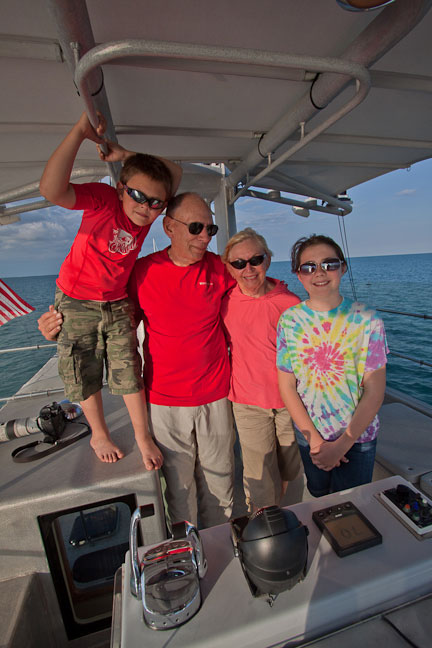
We’ve taken a temporary hiatus from the business of yachting to enjoy hanging out with daughter Elyse, husband Todd, along with Emma and Ian (shown above).
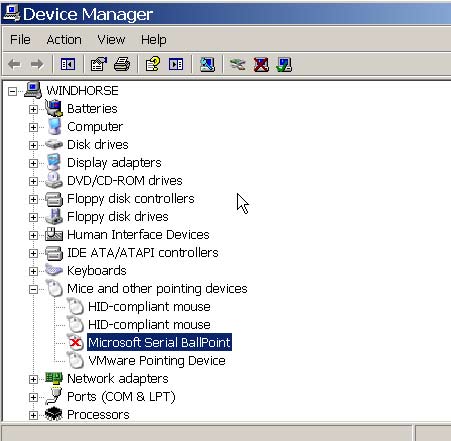
If you are running a Windows computer you may have encountered crazy mouse syndrome. This occurs when the computer thinks the GPS signal is a serial mouse. Here is how we have dealt with this in the past:
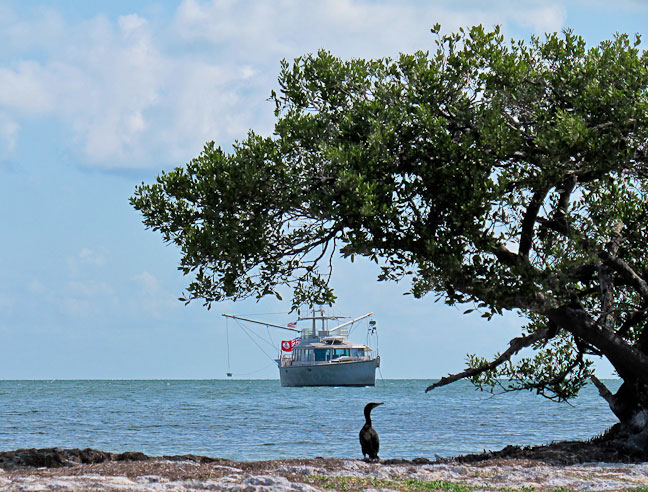
We are hanging out with family in the Florida Cays. Lots of photo ops, and photographers to take advantage. To wit, the photo above by Ian Beveridge, age eight.
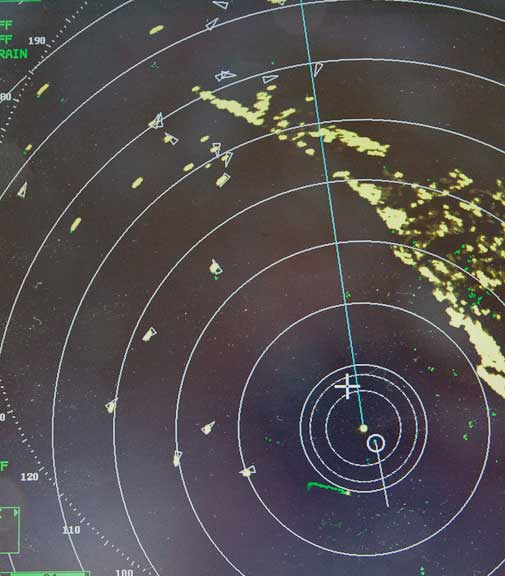
Here are some more examples for the usefulness of radar trails. All of the photos have the trails in true mode, in other words, the actual track of the target.
This first example is coming in to the eastern side of the straights of Gibraltar. The targets without trails are not moving (in this case ships at anchor).
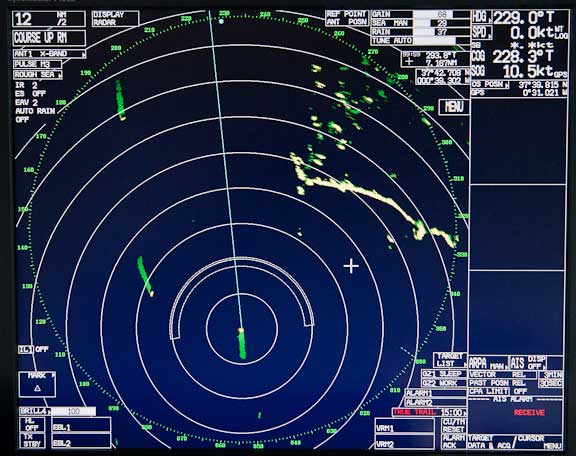
Radar trails are a big help in interpreting what a target is and what it is likely to do.
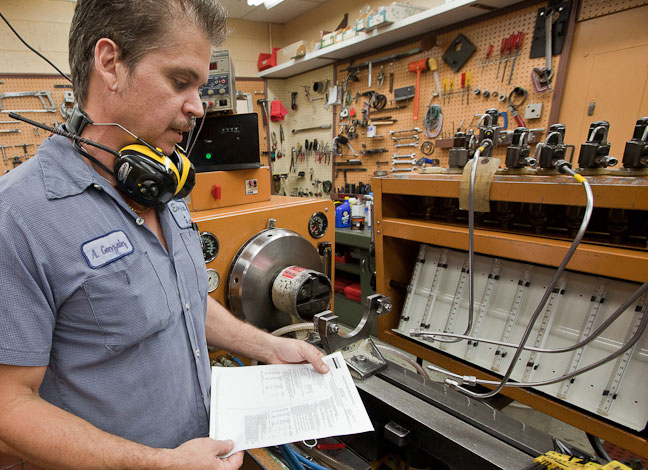
The fuel injection pumps used on diesel engines delivery precisely timed shots of fuel to the fuel injectors. The timing and volume of the fuel controls the torque and horsepower characteristics of the engine. Most engines also come with different ratings, which are typically related to the injection pump characteristics.
Our Deere 4045s on Wind Horse were rated M4, 150HP@2600RPM. M4 means Deere doesn’t want the engine to run wide open more than three hours out of 24. SInce we normally operate between 1750 and 1900 RPM the engines were lightly loaded. At the other end of the rating scale is M-1 which allow full throttle 24 hours a day, and delivers 105 HP at 2300 RPM.
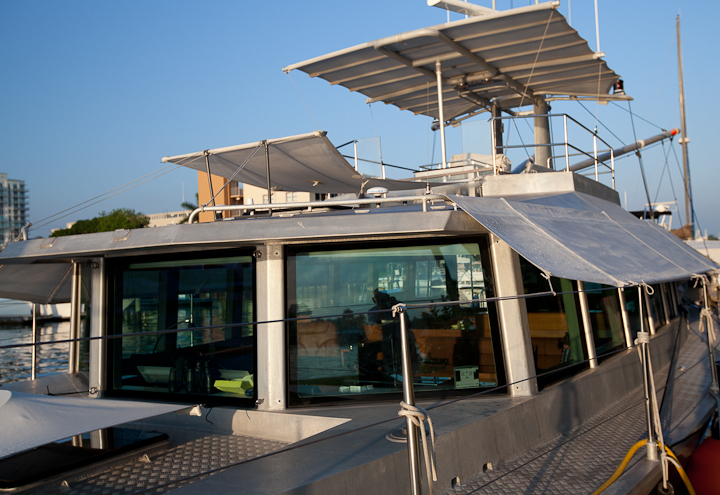
On our sailing designs we have typically been able to avoid air conditioning by engineering good air flow at anchor. But with the FPBs the heat load on all of the glass makes air conditioning a necessity. Back aboard now in Fort Lauderdale, with the sun directly overhead, and temperatures in the afternoon at 88/90F (31/32C), we are putting this to use, and thought a few details might be of interest.
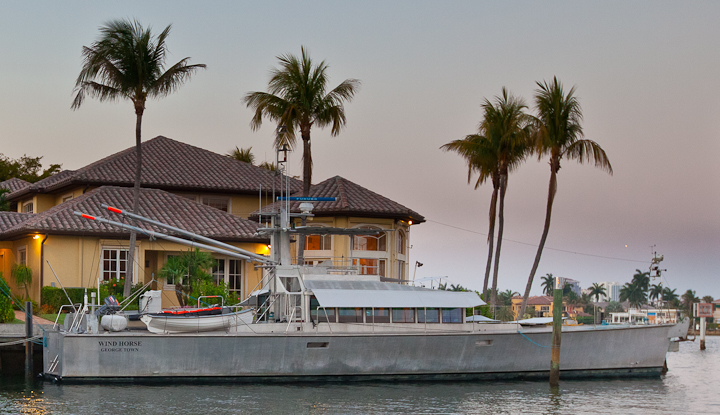
We are happy to report Wind Horse is well rested after sitting in one location the last four months. Her systems are all operational, at least to the extent we can discern tied to a dock.
The test of the high def video server has gone well, so we now have high def versions of more of the FPB 83 Wind Horse available online.
These videos include:
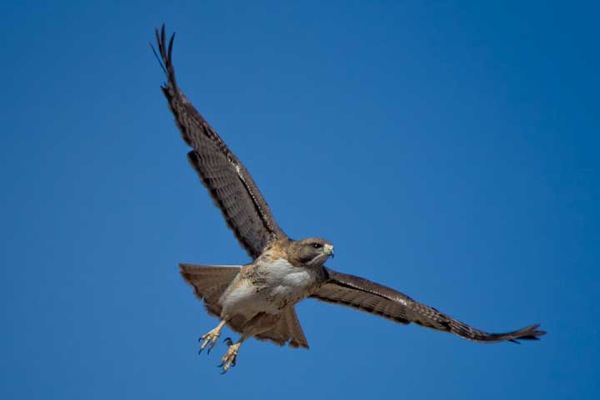
We are headed back to our test bed, getting Wind Horse back into action. There are a series of trials to run with NAIAD stabilizer guru Vic Kuzmovich, to tie down a few things for the FPB 112 (it is nice to have a 2/3rds scale model!). And bit of rest is in order (we’ve been burning the candle at both ends), before we dive back into the world of computer design.

The folks that “serve” our videos to the Internet have upgraded their system and we can now provide much higher definition images to you. We have to redo the output of our video editing software, so the process will take a while. The FPB 83 Wind Horse introduction is the first.
Updated Feb 9, 2018:
You can now simply view the video below, and see all our hi-def videos on our YouTube channel.
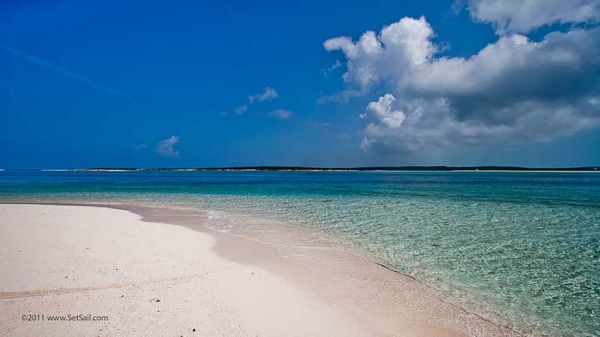
We have added to the collection of screen savers available to download. To check out the collection
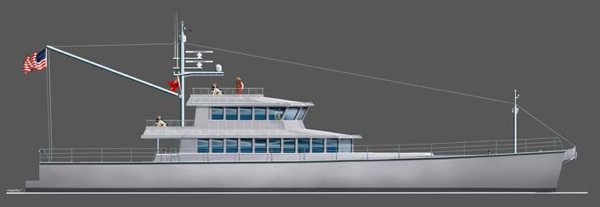
What we fear most in the design cycle is getting so locked into a single concept that we miss a much better approach. That is why we drag out the preliminary end of the process, to try and make sure we look at all avenues. Although the previous riff on the FPB 115 was good, this is much better. And it is not just the aesthetics ( with which we are still fussing). Thanks are due to the previously mentioned prodder (can you imagine coming up with this after having started construction!) for asking the right questions in a timely manner.

As we work on a new design we frequently refer to past projects. We used to overlay paper plots of lines drawings and compare how volume was handled above and below the waterline. There are the numeric values to review of course, but in the end, when you are talking about how a given shape is going to work at sea the designer has to visualize the hull in various combinations of waves. To aid in this process we would often scale the drawings so they were the same size to make comparisons easier.
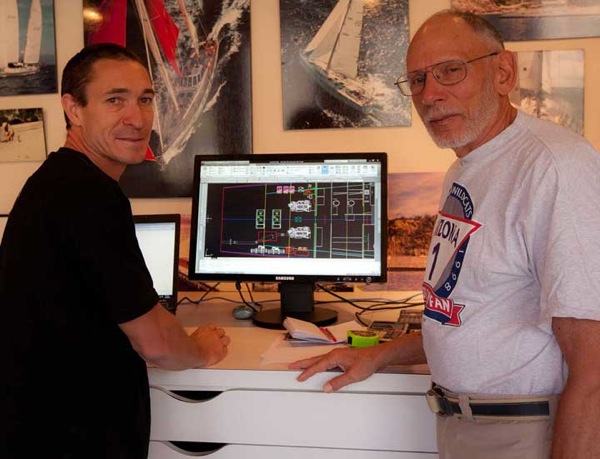
Ed Firth, one of Circa’s engineers, has been with us in Arizona the past week, refining the preliminary FPB 112 design. We thought a few comments on the process might be of interest.
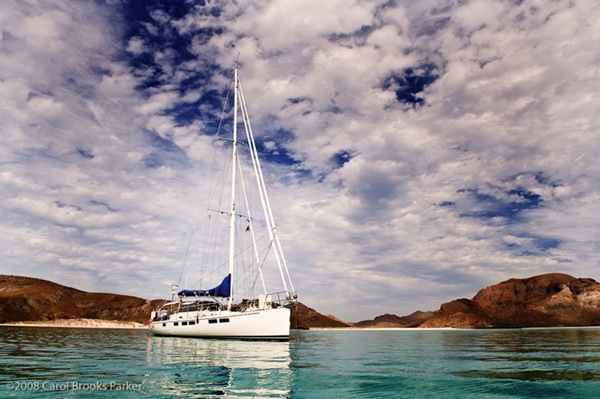
Carol Parker was kind enough to share some wonderful photos of the Sundeer 64, Raven, which she and husband Mike used to own. If you are stuck in depressing weather, waiting for spring, these will do a better job as an antidepressant than those little pills that are often prescribed. This first shot is near La Paz in Mexico’s Sea of Cortez.
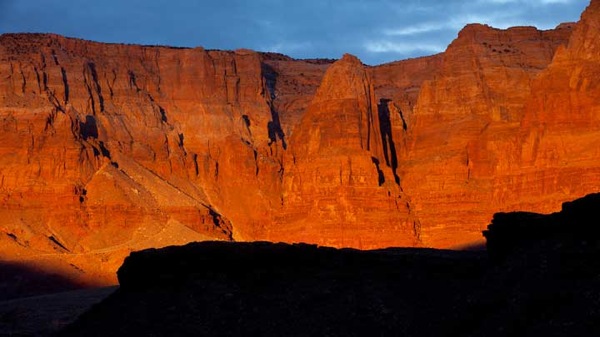
We have always believed that the best approach to life, and keeping the mind fresh, is diversity of experience. So with an intense period coming up on the FPB 112, and a trip to New Zealand for sea trials on two FPB 64s in the offing, we decided to sneak out of the office for a few days. The fact that master photographer Joe Zinn was available to show us some of his favorite spots in Northern Arizona made the choice of where to go easy.
[slidepress gallery=’northern-arizona-cruise’]
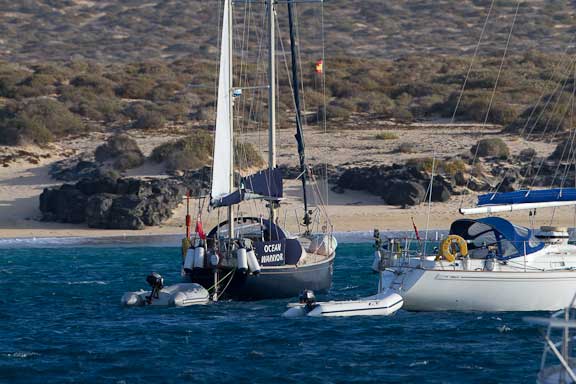
When the breeze starts to blow at anchor most yachts will shear – sail back and forth – at anchor. This can be uncomfortable, and substantially increases the load on ground tackle. The answer to this is a riding sail.
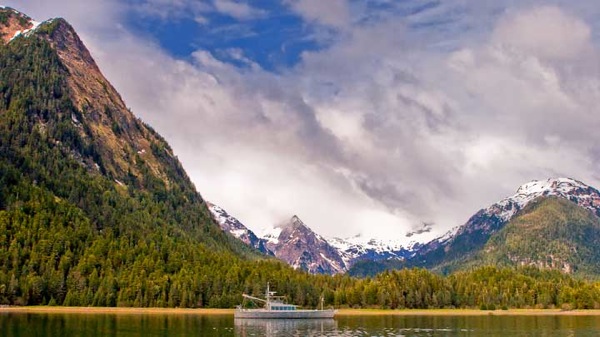
Prince William Sound, in southwest Alaska, is one of those places you just have to visit.
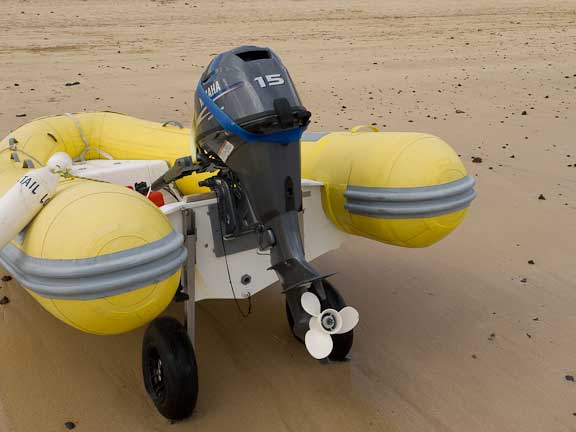
If you spend much time going to the beach with your dinghy you are going to want to consider a set of wheels. Eventually you will find that bigger wheels are always better.
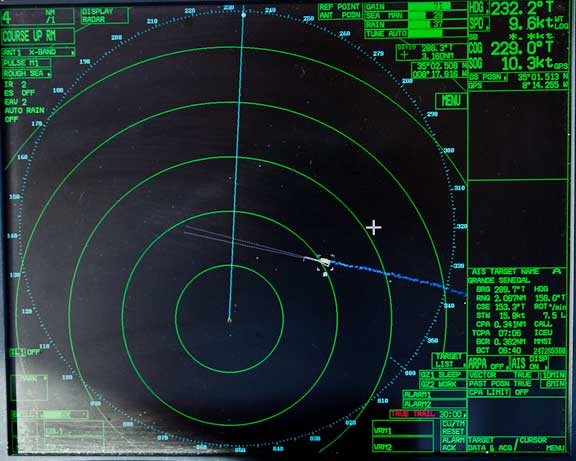
Modern radars have a wonderful ability to project the closest point of approach (CPA) between you and another vessel, and when (TCPA) this will occur. To do this the radar needs to know your speed and heading, and that of the target. Some times there is poor data in the loop in which case the CPA calcs are going to be off. In the photo above the radar is projecting the true course of the ship with the CPA information in the data box beside.
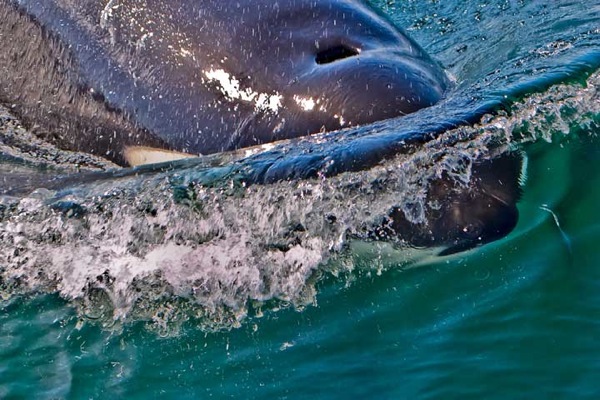
With photo collections and videos now somewhat more organized we have bandwidth to post a few more collections. We’ll start with Baja California and the Sea of Cortez.
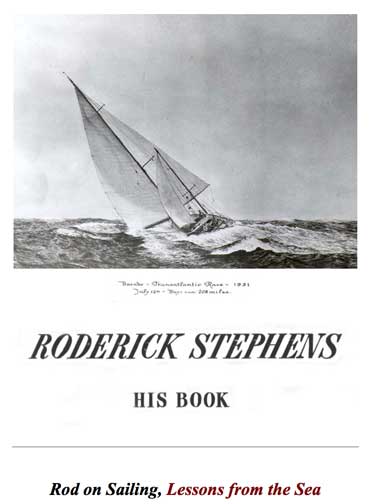
While perusing the Cruising Club of America (CCA) website a few days ago we noticed an item on a partially completed book by Rod Stephens, he of Sparkman and Stephens fame (along with designer brother Olin). We knew, worked with on occasion, and immensely respected this wonderful seaman. Although our meetings and chats over the years were brief, we felt a connection (Rod’s book is available for download on the next page).
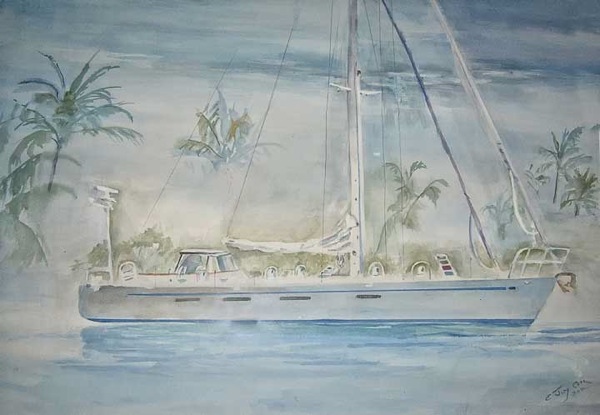
The watercolor above is of a Deerfoot 62. She is the second aluminum yacht we built and is a sistership to our own Intermezzo ll. Both were built in Capetown, South Africa. The photo was sent to us by Tim Gardner of Gardner Yacht Service, Orange Park, Florida. Tim’s comments follow.
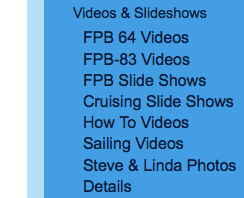
We have reorganized the videos and slide shows to make them more easily accessed. At present there are 47 of these to help pass the time.
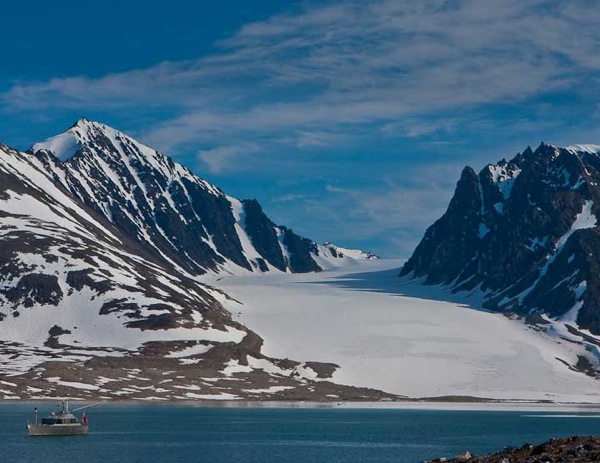
Recently someone commented to us on the amount of territory we cover with Wind Horse, and asked why we approach cruising in this manner.
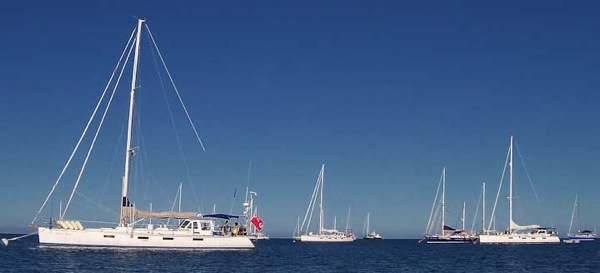
Gordon MacKenzie sent us this great photo of three Sundeers anchored in Musket Cove, Fiji.
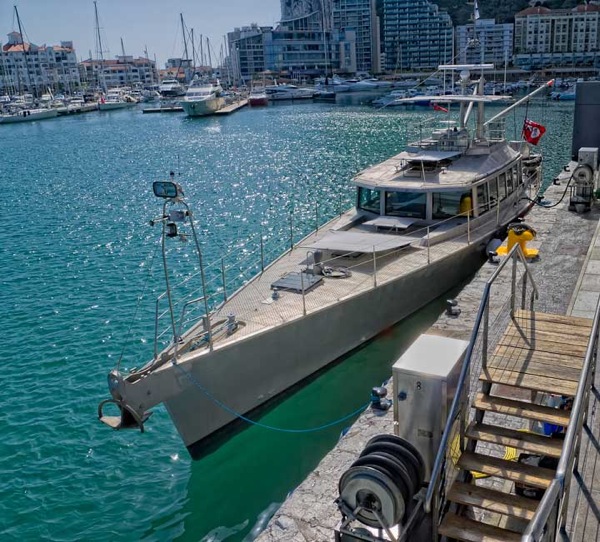 We get a lot of questions about range, fuel burn, boat speed, and how this works out in the real world. Whether you have an FPB or a trawler, the same basic issues apply. In this blog we are going to review the factors which impact the fuel equation and then compare data for several different types of vessels. The photo above and below of the FPB 83 Wind Horse, were taken in Gibraltar, a favorite (low cost) fuel stop. Read the rest »
We get a lot of questions about range, fuel burn, boat speed, and how this works out in the real world. Whether you have an FPB or a trawler, the same basic issues apply. In this blog we are going to review the factors which impact the fuel equation and then compare data for several different types of vessels. The photo above and below of the FPB 83 Wind Horse, were taken in Gibraltar, a favorite (low cost) fuel stop. Read the rest »

What’s wrong with this photo? Hint: the freeboard is touch low.
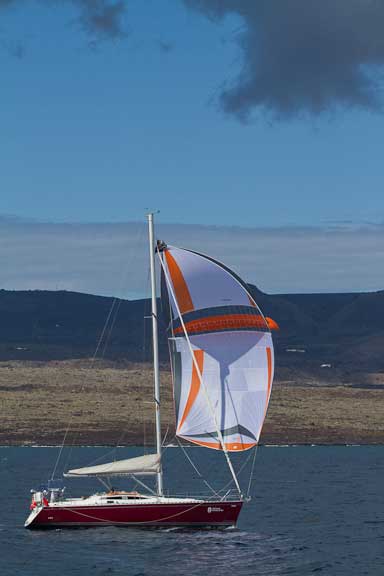
Some time ago we promised detailed photos of the stabilized spinnaker design which we shot in the Canary Islands. The concept is that the shuttered slots across the face of the sail reduce oscillation and improve stability. It is hard for us to judge the efficacy of the concept from a brief encounter, but it does look interesting.

Every now and then we see something new which really works and is such an obvious answer that it is amazing it was not done previously.
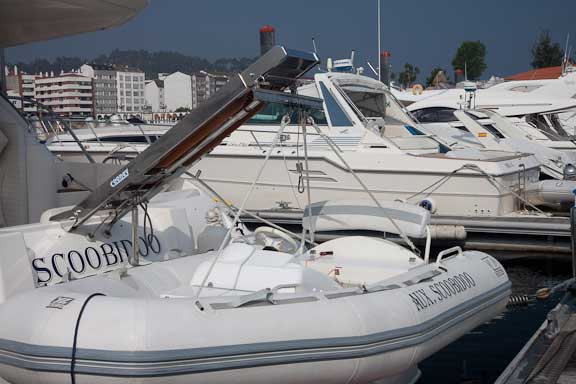
Here is an interesting use of the passeral we saw on a number of motor yachts. The dinghy in this photo will weigh close to 1000 pounds/450kg so there is substantial load with which the lifting mechanism must deal. It does make for a clean system.

If you have the dinghy rigged properly, and hanging over the side at anchor, single person launching is quite simple.
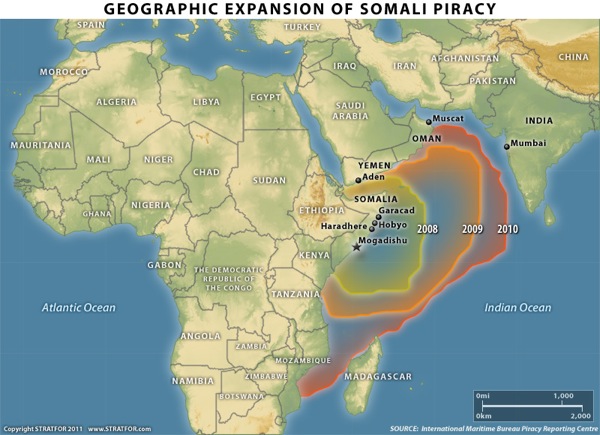
For most of us Somali piracy is a curiosity. But if you are crossing the Indian Ocean these days, even headed south towards South Africa, the risks are real. Stratfor is what we would call a private State Department or risk analysis outfit. Formed by George Friedman, they are considered the best in this business by the professionals. Their recently published report on Somali piracy
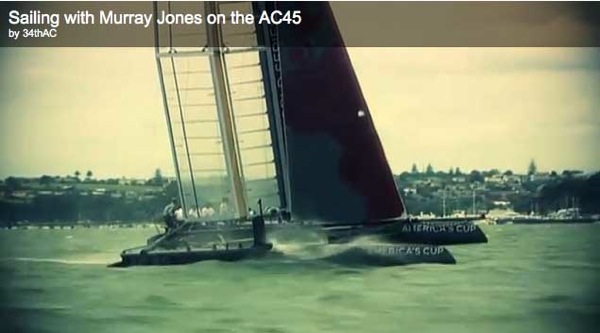
OK sports fans, today we have a glimpse into the future. For those of you opposed to the use of cats for the America’s Cup, or who are on the fence, take a look at the video we have for you. You will be astonished.

Every fall there is a huge gathering of marine professionals at what is called IBEX. Every major vendor of marine items is there. Along with thousands of items to check out, there is an extensive array of hands on exhibitions and seminars. They have used photos of our designs in the past and this year the IBEX management created a poster featuring the FPB 64 Avatar. You can download a copy of

Anchor snubber lines, shock absorbers in reality, offer a number of benefits and several potential problems. Let’s address the rigging first.
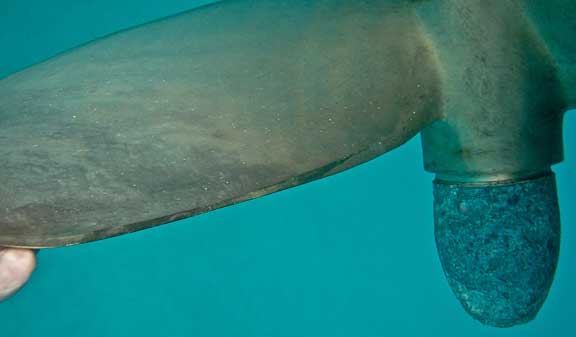
We usually specify what is called an anti-singing edge on our props. Essentially this is a chamfer on the forward face trailing edge of the blades as shown above. Occasionally this is not quite the right shape and at certain RPMs and loadings the prop will start a high pitched, and very annoying, song.
Pete Rossin, on of our FPB 64 owners, has researched protecting wireless Internet communications in the age of “Firesheep”. Pete has been kind enough to share the approach he has adopted, including screen shots, to make a similar installation relatively painless.
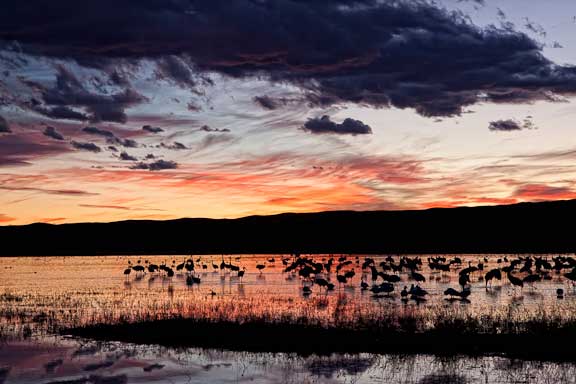
Since wings are a current topic in the marine world we thought this was a good segue to talk about Bosque del Apache.
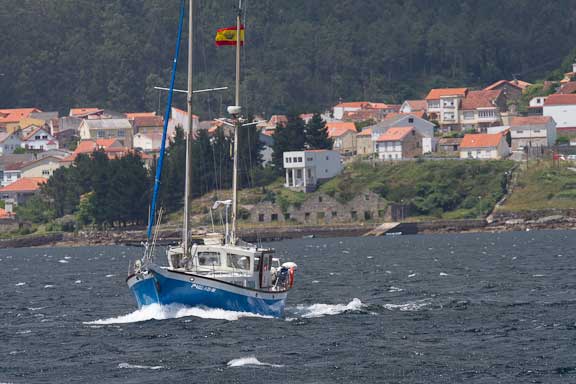
If you are going to cruise in cold climates a large pilot house is worth consideration

There has been a ton of controversy about the format of the next America’s Cup, to take place in 72 foot wing-masted cats. Part of the package is a 45 foot “trainer” to get the crews up to speed on sailing with a wing.
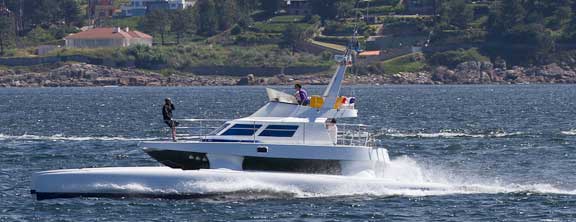
When we first started to think about doing an unsailboat for long distance cruising we briefly considered a power catamaran.

Sobering fact: you are going to be almost invisible to ships in any sort of breeze. A yacht is just too small to stand out in the waves and their white caps. Radar return, even with a radar reflector, is also hard to pick out of sea clutter. The one thing you can do is do paint the upper portion of the mast.
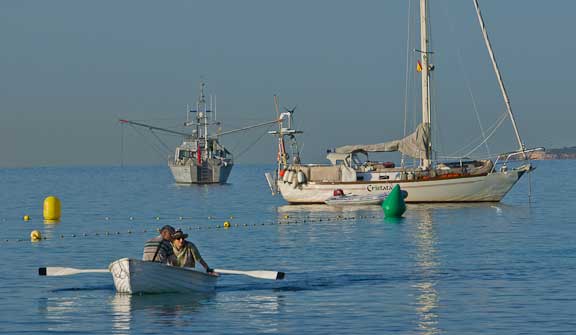
Most of the long term small boat cruisers we know prefer hard dinks to inflatables.
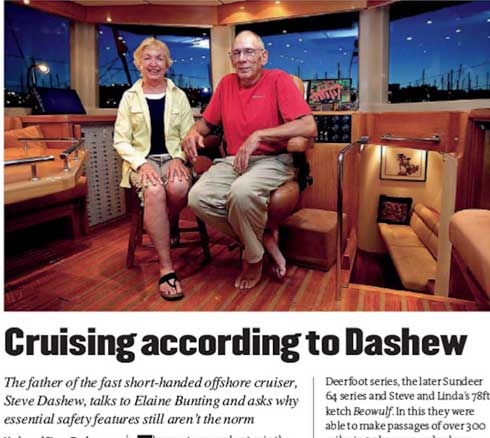
While we were in Las Palmas in the Canary Islands waiting for the ARC to start Wind Horse was the object of scrutiny by quite a few members of the European press. We had numerous journalists and photographers aboard, one of whom was
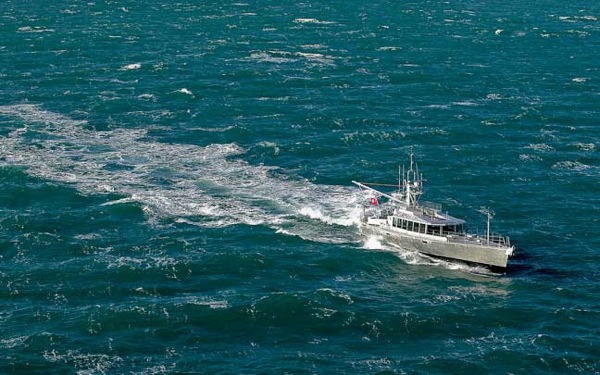
With 5200 hours on the engines, more than 50,000 mile in six cruising seasons, Wind Horse has proven to be our ultimate cruising tool. Now closing in on her seventh year afloat we have the proverbial wish list, with items big and small about which we need to decide. Considering that Wind Horse is being used far more intensively than any of our previous designs, and in much more demanding environments, our wish list is quite short.
When we are aboard, we are always thinking about fine tuning details, the curse of perfectionism with which we have lived these many years. But we have learned to wait before going forward, spend time ashore to give ourselves perspective, and then decide if it is really worth the time, effort, and expense to act on those desires.
This blog is a form of internal discipline. We want to recap how Wind Horse has been used, what is likely in the future, as part of the decision making process. Let’s start with where she has taken us. The distances, comfort level, conditions, and what we have learned.
We recently created a hornets nest of comment here and elsewhere on the Internet when we mentioned what appeared to be a class B AIS filter on our IMO approved Furuno 2117 radar. Ben Ellison, who we consider the dean of marine tech writers, took us to task for spreading a false rumor. Ben has gotten so much conflicting comment that he went to one of the AIS tech mavens for the answer (you can read the final word on this subject here on Ben’s website). There are also a myriad of amateur and professional mariner comments, some of which are of interest.
There are many issues being addressed by commentators. We think most are missing the points which are critical to cruising yachts. To briefly summarize:
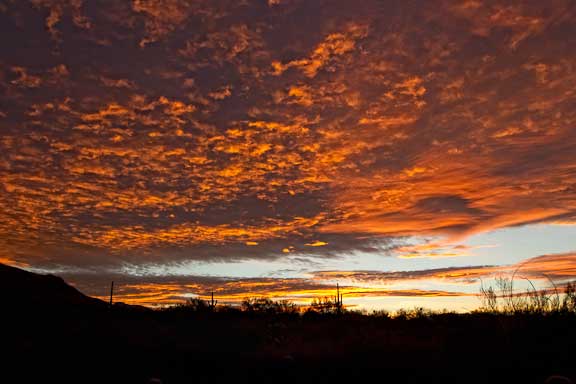
It is that time of year again, cold (it has just snowed in Tucson, Arizona!), yet invigorating, with spectacular sunrises the norm whenever there are early morning clouds.

If you have a mega yacht you are going to want a mega dinghy. Judging from our brief exposure to this scene in the Med. the criteria for these boats begins with style. Take the design above. Ver cool looking, assuredly quick, wet, and hard riding.
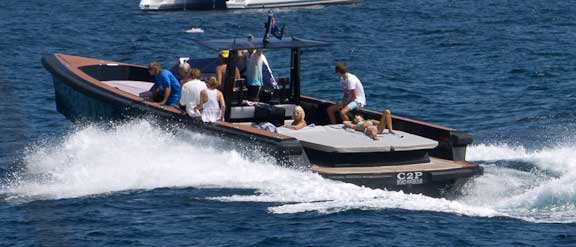
Favorite photos from 2010 aboard Wind Horse: Mallorca, Spain, Portugal, the Canaries, and the ARC rally…
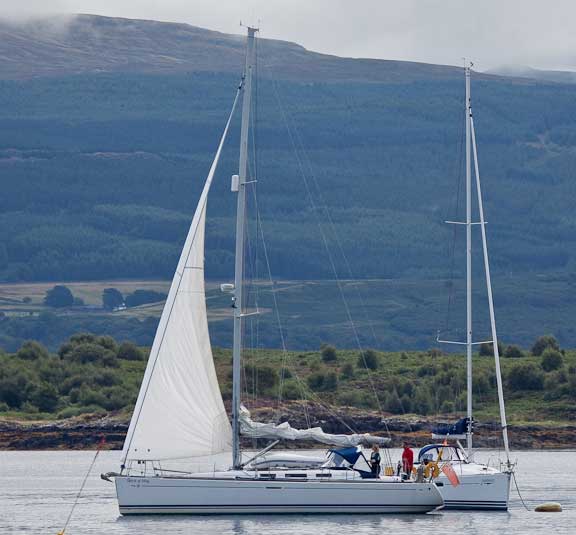
If there is one thing we really miss about our switch to power it is sailing onto and off of the anchor. These folks have the system down pat:
A few weeks ago Ben Ellison had a story on a program called “Firesheep” which makes hacking WiFi signals much easier. Recently John Harries had an even better discussion on his website (be sure to read the comments on both). This issue is of concern to anyone who uses WiFi to send data they would not otherwise want in the hands of someone intent on no good.
Having an expert in this field in our own back yard, Mike Parker, we asked Mike for his take on the Firesheep problem. Mike’s comments follow:
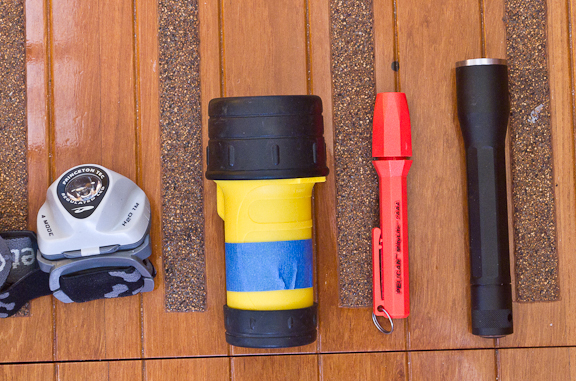
We have a large, somewhat eclectic collection of flashlights aboard Wind Horse. The photo above is a sample of the various types. Each has a special purpose.
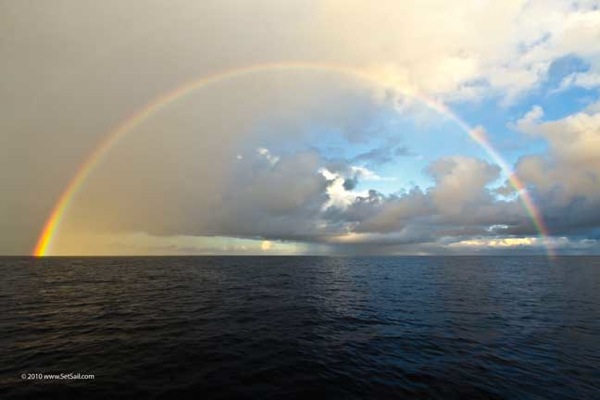
If you are looking to spice up your computer we have added a series of photos to our collection of screen savers.
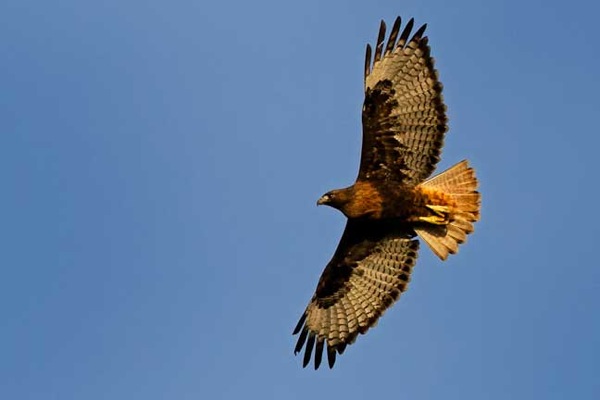
We’re back in our land base with a wonderful welcoming committee. First a pick up at the airport by friends (circumnavigators Michael and Nancy Morrell). Then a red tail hawk sitting on a sahauro cactus in our back yard. who obligingly took flight after we had unpacked the cameras.
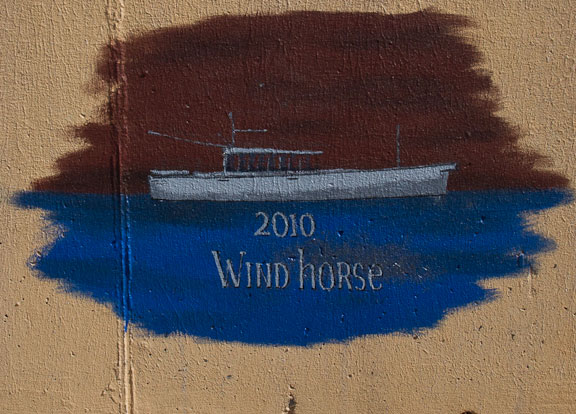
Long time SetSail visitors will know that our personal preference in cruising grounds tends toward invigorating (challenging) environments, ideally isolated, where we are totally on our own. During the 2008 cruising season we shared an anchorage with another yacht just once, last year three times. The normal route back to the States from Europe for us would be Iceland, Greenland, and then Newfoundland, or direct from Ireland to Newfoundland.
A series of factors had us deciding on a more user friendly routing, via Spain, Portugal, and Canary Islands, even though it meant dealing with the crowds that come with civilization.

We have been slowly discovering the changes in the software on the Furuno 2117 radar, included in our recent upgrade. This is an IMO class piece of hardware, in other words, used on commercial vessels, and as such the interface must conform to certain international standards. The screen shot above is in t’he AIS display filter menu. Note the comments on class B AIS and minimum ship length.

Wind Horse is secured at the end of 14th Street in Fort Lauderdale, ready for a well earned rest. Yesterday we went by the dock on 15th where 30 years ago we lived aboard Intermezzo ll testing the market for our concept of a proper cruising yacht. In some ways it feels like we have closed the circle on that endeavor.
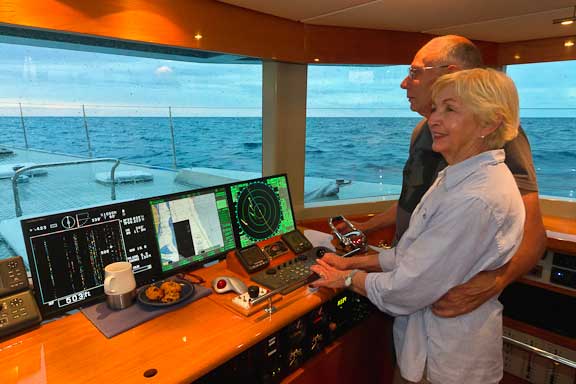
The sun has set on the last day of this year’s cruising. We will be off Port Everglades inlet (Fort Lauderdale) at first light. A winter dock lies in wait, as do e-mails and phone calls too numerous to contemplate. The whirl starts back tomorrow. The recent sojourn across the Atlantic Ocean has been one of our more enjoyable long passages, made all the more so by friends, new and old, on both sides of the pond.
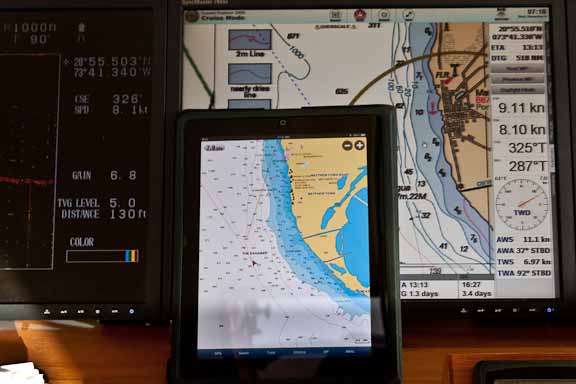
Pete Rossin brought along his new iPad loaded with various cruiser friendly apps. What initially impressed the most is the ability to carry various manuals around, and use them in situ as required. But the navigation potential really got our interest this morning off Great Inagua’s Matthew Town.
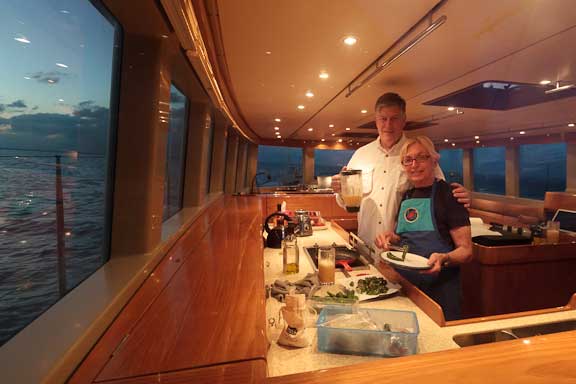
So here we are 16 days and 3700 miles from Las Palmas in the old world, at anchor on our own in the new, with a deserted white sand beach a dinghy ride away. The “Q” flag is at the port spreader, a Bahamian courtesy flag at the starboard, and tomorrow we shall see what Great Inaugua has to offer. We are just 500 miles from the terminus of this year’s cruise, and although holidays with the family loom, neither of us are ready to leave Wind Horse. We almost didn’t stop, not wanting to break our seagoing rhythm. But then the words “60,000 flamingos” jumped off the page, and now our anchor is firmly set, dinner is about to be served, and a movie watched. Tomorrow begins a new adventure.
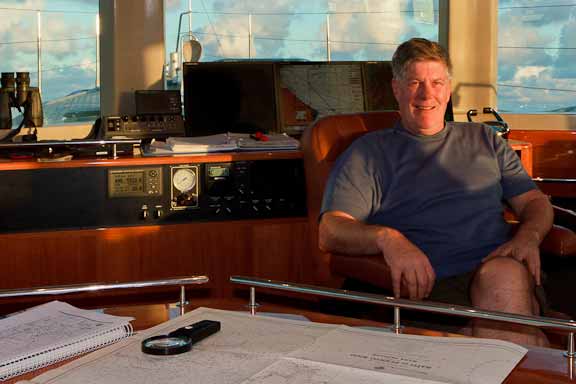
To the detail oriented amongst SetSailors it will be obvious your seagoing correspondents have lost track of the calender, a sure sign it is time for a break from cruising. Part of the problem is the change in time zones that occurs when you are voyaging. Do you adjust the clocks on board, leave them on GMT, the time of the departure point, or change to the destination?
Sunday evening, there is a lovely northeast breeze, a gentle motion, a half a knot of positive current, and we are at sea. It would have been fun to greet our Las Palmas neighbors on the Swan 80, Berenice, when they arrive Monday, but after sitting for three days we have itchy feet and so we are off. The current plan is direct to Fort Lauderdale where Wind Horse shall spend the winter.
The projected route takes us through the Mona Passage between Puerto Rico and the Dominican Republic, then along the Bahamas southern and western flanks. Navigation should be more interesting than that of the recently completed “Pond” crossing.
When the Port Authorities saw our clearance paperwork this morning they could not understand why anyone would leave so soon after crossing the Atlantic, let alone tack on 1400 miles to Florida without a stop. You might be wondering the same.
The reasoning is straightforward: we are comfortable at sea, we have had a friend join us for the passage so the watch standing will be easier, and there is a good weather forecast we do not want to waste.
Now a comment for the gear heads reading this. For the last half of our crossing from Las Palmas the exhaust gas temperature (EGT) for the starboard engine ran about five percent warmer than the port, notice that something had changed. It could have been an injector issue but a clean exhaust ruled this out. The prop was OK. That left air flow, i.e the turbo.
Once underway we did a couple of tests at wide open throttle to check EGT and max RPM. The starboard engine was about 50 revs slower. Next we did both engines at WOT together. After logging this data we noticed the starboard engine EGT was now the same as the port at cruise RPMS. The theory here is the turbo must have been sticky, and the added pressure of running WOT has freed it.
At 0035Z the GPS is indicating 11.7 knots at 1800 RPM. Position: 14 55’14.28 N, 062 18’23.87 W
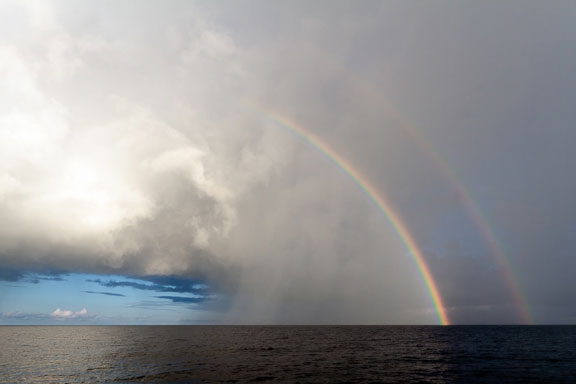
A quick note to let you know we have updated our photos of the Atlantic crossing with larger, higher res versions. You can view these by going back through the posts.
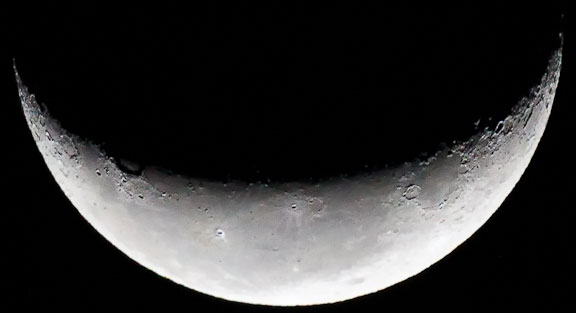
Our last night at sea and we’ve been chasing squalls for their restorative powers. A night of black clouds gives way to clear sky before dawn and the last moon of this passage bids us farewell.
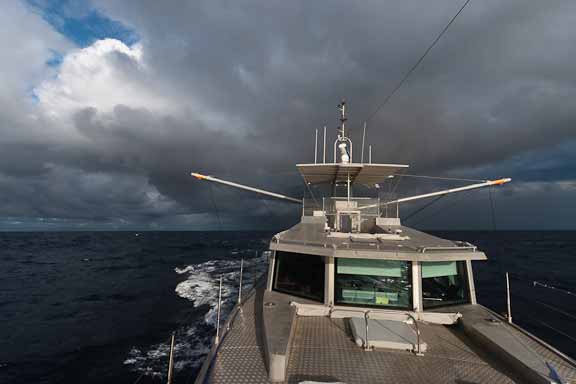
We’ve been surrounded by squalls since late in the afternoon. They have added a touch of pressure and with the wind now squared up behind us we are surfing continuously. Revs have been cut to 1750/1800 with the GPS 20 minute speed average showing 11.5/11.8 knots. This is what we expected for the entire crossing.

Speed often equals reduced motion when you have your design ducks in a proper row. But when you discuss this in polite circles (which for the purposes of this blog we shall include the local sailor’s bar)the concept often generates a hardly concealed look of disbelief. If you have ever ridden a bicycle slowly, wobbling this way and that, you will understand one of the principles which are at work. Or, if you have sailed high performance dinghies, and felt the stability that comes as you transition to a plane, you know whereof we speak.
That the combination of cruising, speed, and comfort is not more universally respected probably has to do with negative experiences brought on by excessive speed in an uncontrollable configuration. But if your autopilot can steer the boat as she accelerates,
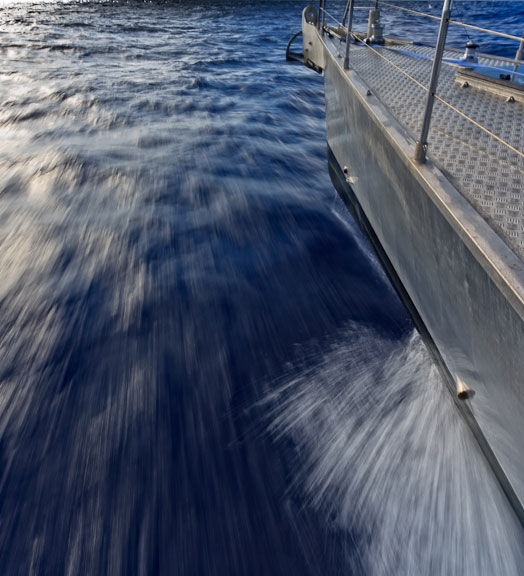
Finally, with 550 nautical miles to go, the Atlantic wind gods have seen fit to authorize a dose of northeast trades. Wind Horse is now enjoying a broad reach, with 15 to 20 knots of breeze at a 150 degree true wind angle. If we were sailing now we’d be carrying kites on both main and mizzen, fully powered up, surfing continuously,and wondering should we shorten down for the squalls?
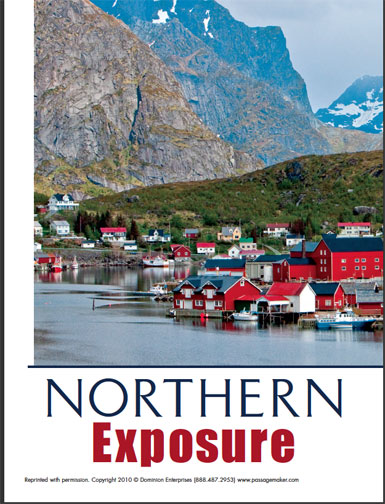
The November issue of PassageMaker magazine has an article of ours on cruising Norway. The folks at PM have been kind enough to allow us to share the piece in PDF form.
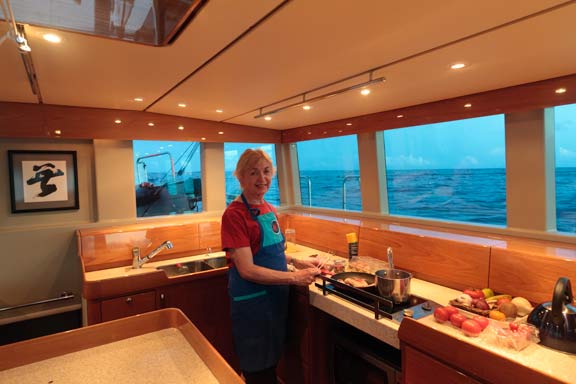
Greetings from the FPB Wind Horse where for most of the past 24 hours the sea state could be considered less than conducive to wandering the planet aboard your home afloat. As sometimes happens, we have been discussing the state of the world, our position in it, and the hard life of the trans Atlantic sailor.
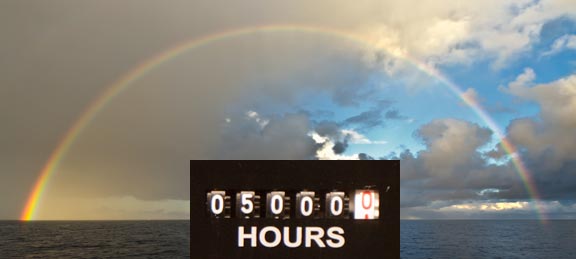
It is another lovely day aboard Wind Horse where beautiful sunsets, sunrises, rainbows, and comfortable seas continue to be the norm. Last night saw the passing of what we think is an astonishing milestone, 5000 hours on our little John Deere diesels. That’s enough time to make almost two laps of the planet, and this in the course of five years of part time cruising. Of particular import is the fact that it has occurred with only the two of us aboard at a time in our lives when we are supposed to be dreaming about what we did when we were younger. For those of you who think the older generation needs to slow down we invite you to inspect our